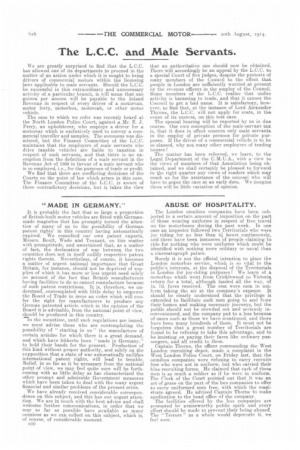The Id.C.C. and Male Servants.
Page 18

If you've noticed an error in this article please click here to report it so we can fix it.
We are greatly surprised to find that the L.C.C. has allowed one of its departments to proceed in the matter of an action under which it is sought to bring drivers of commercial motors within the licensing Jaws applicable to made servants. Should the L.C.C. be successful in this extraordinary and unnecessary activity of a particular branch, it will mean that one guinea per annum will be payable to the Inland Revenue in respect of every driver of a rnotorvan, motor lorry, motorbus, motorcab, or other motor vehicle.
The case to which we refer was recently heard at the North London Police Court, against a Mr. E. J. Perry, an upholsterer, who employs a driver for a motorcar which is exclusively used to convey a coinmenual traveller and samples. The summons was dismissed, but the Finance Committee of the L.C.C. maintains that the employers of male servants who drive taxable vehicles are liable to taxation in respect of such servants, and that thare is no exemption from the definition of a male servant in the Revenue Act of 1869 in favour of a, male servant who is so employed, i.e., for the purposes of trade or profit. We find that there are conflicting decisions of the Courts on the point of law which arises in this case. The Finance Committee of the L.C.C. is aware of these contradictory decisions, but it takes the view that. an authoritative one should now be obtained.. There will accordingly be an appeal by the L.C.C. to. a special Court of five judges, despite the protests of many members of the Council to the effect that people in London are sufficiently worried at present. by the revenue officers in the employ of the Council. Some members of the L.C.C. realize that undue activity is harassing to trade, and that it causes the Council to get a bad name. It is satisfactory, however, to find that, at the instance of Lord AlexanderThynne, the L.C.C. will not apply for costs, in the event of its success, on this test case.
The special hearing will be reported by us in due course. Our own conception of the male-servant tax is, that it does in effect concern only male servants. in the employ of private persons for ,private purposes. If the driver of a commercial veniele is to be so classed, why not many other employees of tradinghouses ?
The matter has been referred, we learn, to the Legal Department of the with a view to the views of members of tha,t Association being obtained, and we shall certainly be pleased to forward to the right quarter any views of readers which may reach us for the assistance of the counsel who will have to argue the case at an early date. We imagine there will be little variation of opinion.






































